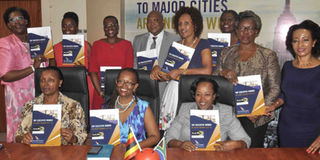Prime
Ugandans asked to exploit S. Africa trade opportunities

South African High Commissioner Lekoa Solly Molly (in grey suit) poses with some business women in Uganda who were selected to tour South African businesses recently. The tour was done in conjunction with South African Airways. PHOTO BY STEPHEN OTAGE
What you need to know:
Ms Jennifer Mwijukye, the chief executive and founder of Unifreight Group, said Ugandans need to take advantage of the opportunities in the region and global market.
Kampala- The former Finance minister has urged Ugandans to maximise trade opportunities with their South African counterparts to benefit from their trade associations.
Ms Maria Kiwanuka highlighted five areas of investment that Ugandans can benefit from by trading with the South Africans.
The areas, which range from distribution, agri-business, manufacturing, financial sector and niche tourism, among others, will improve the economy through employment and foreign direct investments.
“As South African businesses, you are all about having a sustainable and profitable business whereas for us Ugandan businesses and government, we are about having an economic sector that is affordable and relevant to our aspirations,” Ms Kiwanuka told a forum for South African businesses in Uganda last week.
South African businesses in Uganda dominate the key sectors of finance, electricity generation, tourism and retail among others.
However, very few Ugandans are actively involved in trade with South Africa.
Mr Jeff Gable, the chief economist and head of research at Barclays Africa Group, said Uganda’s trade volumes with South Africa amount to 10 per cent of the regional trade.
Kenya makes up the most with 47 per cent, followed by Tanzania at 40 per cent while Rwanda and Burundi stand at 2 and 1 per cent, respectively.
He said total trade volumes between Uganda and South Africa for the last five years have declined from $242m (Shs815 billion) in 2010 to $226m (Shs761 billion) in 2015.
Mr Gable said the economic outlook for Uganda is bright because of the economic resource boom.
“On the resource side, there is expected investments of $8 billion (Shs27 trillion) spend on the production of oil which will boost the economy,” he said.
However, Mr Gable said if Uganda is compared to other countries in Sub-Saharan Africa, tax collection remains very low.
He also warned that the increased focus on infrastructure for long-term projects, saying this increases Uganda’s fiscal burden.
“Higher development expenditure means more fiscal debt burden. Uganda needs to be more cautious that the investment they are borrowing to fund will generate enough money, more than what was borrowed to invest in the project,” Mr Gable said.
Ms Jennifer Mwijukye, the chief executive and founder of Unifreight Group, said Ugandans need to take advantage of the opportunities in the region and global market.
“This can be done through partnerships with established South African companies which will help them overcome challenges that they would have faced going at it alone,” she said.
Whereas reports and economic growth projections are used to determine where the next basket of growth will be, Mr Fred Muhumuza, and economist, said Africa was reported to be rising because of factors that were largely outside Africa. But proper statistical projections that can predict growth for Africa are still lacking, Mr Muhumuza said.
“If the interest rates abroad are at zero per cent, then those countries should look to invest in Uganda and earn a return on their investment,” Mr Muhumuza said.




